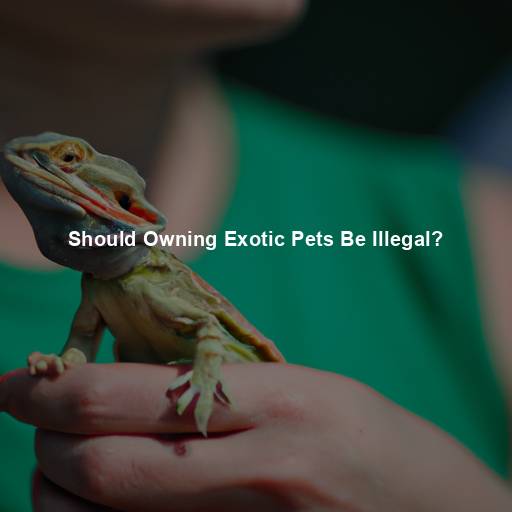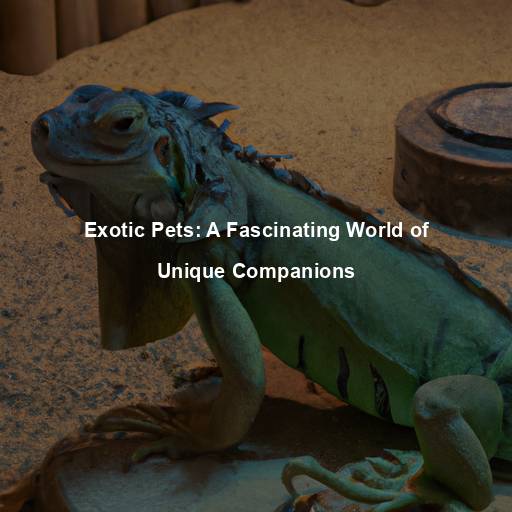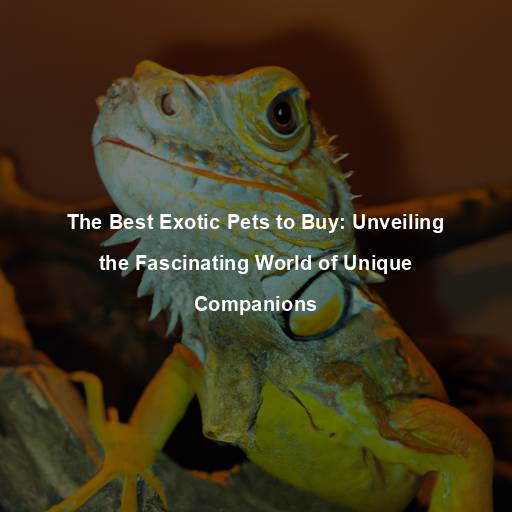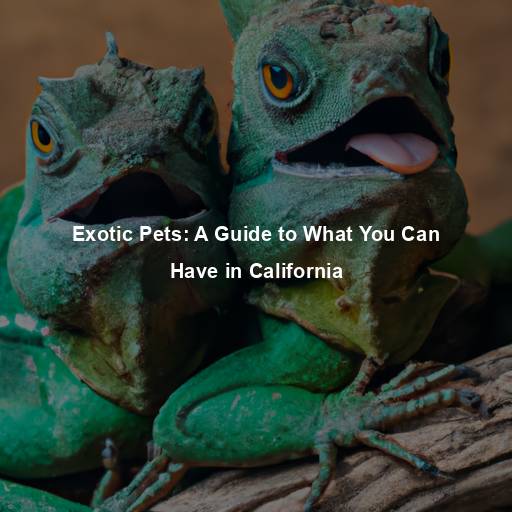Should Owning Exotic Pets Be Illegal?
Last Updated on July 31, 2023 by Evan
Contents
- 1
- 2 The Case for Legalizing Exotic Pets
- 3 The Case Against Legalizing Exotic Pets
- 4 Striking a Balance: Regulation and Education
- 5 Exotic Pets and Human Safety
- 6 The Emotional Impact of Exotic Pet Ownership
- 7 The Role of Education and Research
- 8 The Importance of Conservation
- 9 The Role of Legislation and Regulation
- 10 FAQs on Should Owning Exotic Pets be Illegal
- 10.1 What defines an exotic pet?
- 10.2 Why should owning exotic pets be considered for legality?
- 10.3 Can exotic pets be properly cared for in a home environment?
- 10.4 Do exotic pets pose risks to public safety?
- 10.5 Are there any potential negative consequences of banning exotic pet ownership?
- 10.6 What are the economic implications of banning exotic pet ownership?
- 10.7 How can prospective owners satisfy their desire for exotic animals if a ban is implemented?
For ages, people have held divergent opinions on the ownership of exotic pets. On one hand, there are those who contend that the acquisition of these remarkable and extraordinary creatures can elicit immense delight and a sense of contentment. However, on the other hand, there are lingering apprehensions regarding the well-being of these animals, as well as the potential hazards they might pose to both human beings and the environment at large. In this captivating piece, we will skillfully navigate through the multifaceted arguments on both ends of the spectrum, and venture into the captivating inquiry that beckons us: should the ownership of exotic pets be deemed illegal?
The Fascination with Exotic Pets
Humans have always been captivated by the allure of the exotic. From the majestic beauty of big cats to the enchanting colors of tropical birds, these creatures possess an undeniable charm that intrigues and attracts many individuals. The desire to own an exotic pet often stems from the fascination with their rare and uncommon qualities, as well as the opportunity to showcase their uniqueness to others. However, it is crucial to examine the ethical considerations and potential consequences associated with owning such animals.
The Case for Legalizing Exotic Pets
Personal Freedom and Responsibility
There is an ongoing debate surrounding the ownership of exotic pets, with proponents arguing for the freedom of choice when it comes to our non-traditional companions. They make a compelling case that responsible pet ownership transcends the boundaries of domesticated animals and encompasses the vast array of species that exist. These advocates stress the need for extensive education on the unique care needs of these exotic pets, advocating for rigorous licensing processes and stringent regulations to safeguard their well-being. It’s a complex issue that requires thoughtful consideration and a delicate balance between personal freedom and animal welfare.
Conservation and Education
Another argument in favor of legalizing exotic pets revolves around the potential benefits for conservation efforts and educational purposes. Zoos and sanctuaries often struggle to provide adequate resources to protect endangered species, and private ownership of these animals can contribute to their preservation. Moreover, having exotic pets in private homes can serve as a unique opportunity for education and raising awareness about the importance of biodiversity and wildlife conservation.
Economic Impact
The call to legalize exotic pets echoes with a tantalizing promise: an economic whirlwind that swirls through pet stores, breeders, and even the paws of veterinarians. With the demand for these captivating creatures, industries can luxuriate in the surge of eager buyers. But the enchantment doesn’t stop there. It casts its spell on tourism too, conjuring up visions of vibrant communities flourishing as visitors flock to witness these exotic wonders up close.
The Case Against Legalizing Exotic Pets
Animal Welfare Concerns
When it comes to the thorny subject of exotic pet ownership, the welfare of these animals takes center stage. It’s no secret that exotic species have incredibly intricate needs – from their physical requirements to their social and environmental ones- which are bewilderingly difficult to replicate in the confines of a regular household. The repercussions can be dire – stress levels skyrocket, diets go haywire, and living conditions become woefully inadequate, resulting in a slew of physical and behavioral problems. And let’s not forget about the underlying issue of capturing these creatures from their natural habitats in the first place – a practice that not only exacerbates their distress but also disrupts ecosystems along the way.
Public Safety and Health Risks
The controversial debate surrounding the ownership of exotic pets continues to bewilder both enthusiasts and critics alike. The captivating allure of these extraordinary creatures, with their seemingly serene demeanor, has enigmatic depths that shroud their true nature. Alarming accounts of unexpected aggressiveness or daring escapes have ignited a sense of unease, beckoning us to question the potential perils they may pose to human safety. Moreover, the enigmatic aspect of zoonotic diseases brings forth a worrisome conundrum, as some exotic species can harbor afflictions that can afflict humans, serving as an alarming public health hazard.
Environmental Impact
The introduction of exotic species into non-native environments can have detrimental effects on local ecosystems. These animals may outcompete native species for resources, disrupt natural food chains, and even lead to the extinction of certain species. Additionally, if released or escaped into the wild, exotic pets can become invasive species, causing irreversible damage to delicate ecosystems.
Striking a Balance: Regulation and Education
Implementing Strict Regulations
To address the concerns surrounding exotic pet ownership, many argue for the implementation of stricter regulations. These regulations would include thorough vetting processes, mandatory licenses, and regular inspections to ensure proper care and welfare of the animals. By imposing stricter guidelines, governments can mitigate the risks associated with owning exotic pets and hold owners accountable for their responsibilities.
Education and Awareness
When it comes to owning exotic pets, education is the key to unlocking a world of responsible ownership. By getting people up to speed on the unique needs and demands of these animals, we can make sure that they thrive in their new homes. And it’s not just about the practical stuff like diet and behavior – it’s also about raising awareness of the ethical implications and potential risks involved in keeping these creatures as pets. Let’s spread the knowledge and create a more compassionate and educated society of exotic pet owners!
Supply and Demand
The exotic pet trade is a lucrative industry driven by the demand for unique and rare animals. From reptiles and amphibians to primates and big cats, a wide range of species is targeted for capture and sale. This global trade often involves illegal activities, such as smuggling and trafficking, which further exacerbate the ethical and conservation concerns associated with owning exotic pets.
Ethical Considerations
The issue of owning exotic pets goes way beyond just the well-being of the animals. There’s a whole messy ethical stew to contend with. From the questionable methods used to capture and transport these creatures, to the heartbreaking separation from their families, to the downright stressful conditions they endure – it’s a lot to unravel. And let’s not forget the ripple effect: this trade fuels a demand for profit-driven breeding facilities that often prioritize profits over the animals’ welfare, resulting in some pretty dire living situations.
Exotic Pets and Human Safety
Public Incidents and Attacks
In a world where the allure of owning exotic pets has surged in popularity, a disturbing trend emerges – a dark underbelly that cannot be ignored. These captivating creatures, once revered for their beauty and exoticism, are now causing perplexing harm to those who dare to keep them in the confines of their domestic haven. Their innate instincts, often misunderstood and misinterpreted, have led to eery incidents of attacks on owners, bystanders, and even innocent families. Despite attempts at taming and socializing these enigmatic beings, the unsettling truth remains: the risks they pose are undeniable, thriving when their primal needs are left unfulfilled.
Escapes and Invasive Species
Exotic pets have a higher risk of escape compared to their domestic counterparts. When these animals manage to break free from their enclosures, they can become a threat to local communities and ecosystems. Escaped exotic pets can disrupt local wildlife populations, damage crops, and even pose risks to native species. The introduction of invasive species can have far-reaching consequences for biodiversity and ecological balance.
The Emotional Impact of Exotic Pet Ownership
Bonding and Companionship
Proponents of owning exotic pets emphasize the unique bonds and companionship that can develop between humans and these extraordinary creatures. The opportunity to interact with animals that are not commonly found in domestic settings can be emotionally fulfilling for some individuals. Supporters argue that these relationships can deepen our understanding of different species and foster a sense of empathy and compassion.
Emotional Challenges and Responsibility
While the emotional rewards of owning exotic pets can be significant, it is essential to acknowledge the challenges and responsibilities that come with it. Exotic animals often require specialized care, diet, and environmental conditions that may be difficult to replicate in a home setting. The emotional toll of providing for these animals can be substantial, requiring a deep commitment to their welfare and well-being.
The Role of Education and Research
Promoting Responsible Ownership
Owning an exotic pet is no small feat, folks! Education is the key ingredient that sizzles in the recipe of responsible ownership. We’re talkin’ about providing juuuust the right amount of info to potential pet parents, so they can fully grasp the needs and demands of these wild wonders. And let’s not forget about the edu-mazing initiatives that spread the word on the risks and consequences of impulsively bringing an exotic home.
Encouraging Conservation Efforts
In the vast realm of conservation, the intertwining paths of research and education weave a tapestry of hope. Delving into the enigmatic world of exotic species, scientists illuminate the intricacies of their behaviors, the secrets of their habitat requirements, and the mysteries of their breeding patterns. Armed with these invaluable insights, conservation programs and the preservation of precious habitats stand on the precipice of possibility. As this knowledge cascades into the public domain, a harmonious symphony of understanding and empathy emerges, cultivating a profound appreciation for these magnificent creatures and their delicate ecosystems.
Pet Industry Growth
The ownership of exotic pets can have a significant economic impact. The demand for these unique creatures has led to the growth of specialized pet stores, breeders, and suppliers catering to the needs of exotic pet enthusiasts. These businesses contribute to job creation and economic growth, providing opportunities for individuals passionate about working with and caring for these animals.
Tourism and Entertainment
The allure of exotic pets extends beyond just the realm of personal companionship. In fact, these captivating creatures have found their place in the bustling domains of tourism and entertainment, shrouding the atmosphere with an air of intrigue and enchantment. From the majestic zoos and mesmerizing aquariums to the alluring wildlife parks, these havens beckon travelers from every corner of the globe, infusing the local economies with vitality and fostering the remarkable phenomenon of globetrotting. Furthermore, the allure of witnessing exotic beings in action takes center stage as wildlife-themed shows and performances tantalize audiences, igniting their curiosity, and fueling the revenue streams with each awe-inspiring spectacle.
Research and Innovation
The allure of exotic pets sparks a whirlwind of curiosity, propelling researchers and veterinarians into a captivating realm of discovery. Peering into the enigmatic lives of these animals, they delve deep into the intricacies of their biology, behavior, and health requirements. This labyrinth of knowledge intertwines with the flourishing fields of veterinary medicine, animal welfare, and conservation, birthing marvels that extend far beyond the confines of pet ownership. As these explorations unfurl, the economic ripples reverberate, echoing profound implications for the well-being of both humans and animals alike.
The Importance of Conservation
Threats to Wild Populations
One of the primary concerns associated with the exotic pet trade is its impact on wild populations. The demand for these animals can drive illegal capturing, poaching, and smuggling, leading to population declines and biodiversity loss. Many species targeted for the pet trade are already endangered or threatened due to habitat destruction and other human activities. The continued exploitation of these animals further jeopardizes their survival in the wild.
Conservation through Captive Breeding
While owning exotic pets can contribute to conservation efforts, it is important to distinguish between responsible ownership and activities that harm wild populations. Captive breeding programs, when conducted ethically and with conservation goals in mind, can help preserve endangered species. These programs ensure genetic diversity and provide a potential source for reintroduction into the wild, aiming to bolster wild populations rather than deplete them.
Supporting Habitat Conservation
Conservation efforts should not solely rely on captive breeding. Protecting the natural habitats of exotic species is crucial for their long-term survival. By supporting organizations and initiatives dedicated to habitat conservation, individuals can make a direct impact on preserving the ecosystems that these animals rely on. This includes efforts to combat deforestation, promote sustainable land use practices, and address the underlying causes of habitat destruction.
The Role of Legislation and Regulation
Balancing Personal Freedom and Responsibility
The fascinating world of owning exotic pets is a kaleidoscope of legal perplexity. As we traverse across jurisdictions, we encounter a patchwork quilt of regulations, ranging from strict to shockingly lenient. The conundrum lies in striking the delicate equilibrium between personal freedom and the responsibility to protect both the welfare of these extraordinary creatures and the safety of society and our environment. Only through thoughtful legislation can we hope to navigate this complex landscape and ensure that those who choose to embrace the exotic do so with an unwavering commitment to both fascination and preservation.
Licensing and Permitting
An effective regulatory framework for exotic pet ownership often includes licensing and permitting systems. These systems require potential owners to demonstrate their knowledge and ability to care for these animals properly. Licensing can help ensure that individuals are aware of the specific needs and requirements of the species they wish to own, as well as the legal and ethical responsibilities that come with it.
Monitoring and Enforcement
Ensuring compliance goes beyond mere regulations; the real magic lies in robust monitoring and enforcement measures. Picture this: diligent inspections conducted by skilled professionals are key to unearthing instances of negligence, maltreatment, or improper handling. But that’s not all – penalties for transgressions should be hefty enough to discourage reckless ownership practices, and to empower individuals to wholeheartedly embrace the regulatory framework.
FAQs on Should Owning Exotic Pets be Illegal
What defines an exotic pet?
Discover the captivating world of extraordinary companions that defy convention. Exotic pets, fascinating species hailing from distant lands, have crept into the hearts of unconventional pet enthusiasts. Expanding beyond the realm of traditional domesticated companions, these enchanting creatures range from striking reptiles to vibrant avian marvels, from tiny hedgehogs and sugar gliders to enigmatic primates, and even the majestic big cats. Prepare to embark on a beguiling journey into the realm of the unknown, where the possibilities of connection and bewilderment intertwine in a tapestry of bewildering splendor.
Why should owning exotic pets be considered for legality?
There are several reasons why the legality of owning exotic pets should be explored. Firstly, many exotic animals have specific dietary, environmental, and social needs that are challenging to provide in a domestic setting. Consequently, their physical and mental well-being may be compromised when kept as pets. Additionally, the trade and capture of exotic animals for the pet industry often involves cruelty, illegal trafficking, and threats to wild populations. Stricter regulations can help protect both the animals and the environment.
Can exotic pets be properly cared for in a home environment?
While it is true that some individuals may be able to provide adequate care, it is important to consider the average pet owner’s ability to meet the needs of exotic animals. They often require specialized diets, enclosures, and veterinary care that can be difficult and expensive to maintain. Moreover, some species have specific behaviors and instincts that may not be compatible with a home environment. It is crucial to prioritize the welfare of the animals to ensure they lead fulfilling lives.
Do exotic pets pose risks to public safety?
While it may seem tempting to welcome an exotic pet into your life, it’s crucial to acknowledge the potential risks they can pose. The truth is, wild animals are wild for a reason – their inherent strength and unpredictability make them less than ideal companions in domestic settings. Even the most well-meaning owners might not be adequately prepared to handle the inevitable challenges that come with owning such creatures. Tragic instances of escapes or attacks serve as harsh reminders that regulating ownership is not just about ensuring public safety, but also safeguarding the well-being of these captivating beings themselves.
Are there any potential negative consequences of banning exotic pet ownership?
The debate surrounding the ban on owning exotic pets ignites a flurry of contrasting viewpoints, spinning the topic into a whirlwind of uncertainty. While the intention behind such a prohibition is to safeguard the welfare of animals and ensure public safety, the repercussions cast a perplexing shadow. Responsible and devoted pet owners who shower their exotic companions with love and diligent care could bear the brunt of this sweeping ban. Furthermore, the abrupt plummet in demand for these captivating creatures may sow the seeds of a clandestine market, rendering it enigmatic to oversee and regulate their trade. To navigate these choppy waters, thorough educational initiatives and awareness programs should accompany any potential ban, fostering a culture of responsible pet ownership and offering viable alternatives.
What are the economic implications of banning exotic pet ownership?
The issue of banning exotic pet ownership presents a perplexing dilemma with potentially conflicting economic outcomes. On the one hand, the vibrant pet industry, fueled by the allure of exotic creatures, contributes substantially to the economy through various revenue streams, from sales and breeding programs to pet supplies and medical services. A ban would undoubtedly disrupt this bustling industry, unleashing a wave of job losses and diminished profits. However, it’s crucial not to overlook the hidden complexities surrounding the illegal wildlife trade, which often wreaks havoc on the environment and society at large, with consequences ranging from habitat destruction to the spread of diseases. To navigate this intricate landscape, redirecting resources towards conservation endeavors and promoting responsible pet ownership may hold the key to unlocking long-term economic benefits while safeguarding our environment.
How can prospective owners satisfy their desire for exotic animals if a ban is implemented?
If owning exotic pets becomes illegal, there are alternative ways for individuals to appreciate and support these animals. Ethical considerations should be made, such as visiting reputable sanctuaries, zoos, or wildlife reserves that prioritize conservation and animal welfare. Engaging in wildlife photography, volunteering in animal rescue organizations, or supporting conservation projects can also offer fulfilling experiences while promoting responsible stewardship of exotic species.







